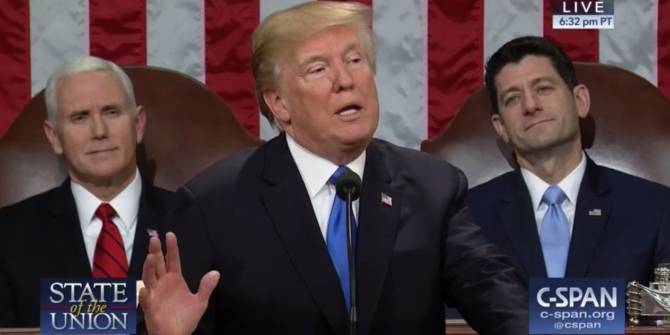 On 16 September, Texas’ Attorney General, Ken Paxton was acquitted on all impeachment charges by the state’s Senate. The vote followed a two-week senate trial following the Texas House’s approval of 16 articles of impeachment in May. Veronica Vega Reyna writes on Paxton’s impeachment, commenting that despite a defense from Donald Trump, legal challenges remain for the state’s Attorney General.
On 16 September, Texas’ Attorney General, Ken Paxton was acquitted on all impeachment charges by the state’s Senate. The vote followed a two-week senate trial following the Texas House’s approval of 16 articles of impeachment in May. Veronica Vega Reyna writes on Paxton’s impeachment, commenting that despite a defense from Donald Trump, legal challenges remain for the state’s Attorney General.
Impeachment is a tool that gives legislative bodies the power to remove a public official from office; in 2019 and 2021 the then President Trump was impeached by the US House of Representatives on charges of charges of abuse of power and obstruction of Congress, and inciting insurrection, respectively. In Texas, this process closely mirrors the federal process. Texas Attorney General Ken Paxton’s impeachment has been in the spotlight in recent weeks, marking a significant event in Texas’ political history.
The impeachment process in Texas
Under Article 15 of the state’s constitution, when the Texas House believes an official has overstepped their boundaries or acted unethically, it can bring forward articles of impeachment against them. If a majority of Texas House members vote to impeach, then the Texas Senate deliberates on these charges. Here, two-thirds of the senators present must vote in favor of removing an official from office.
On May 27, 2023, Attorney General Ken Paxton joined the ranks of the few, becoming the third official in Texas history to be impeached by the Texas House. As the Attorney General, Paxton’s duties include defending Texas laws and representing the state in litigation. The charges against Paxton were severe: 20 articles of impeachment touching on bribery, unfitness for office, and abuse of public trust, predominantly tied to his close association with Austin real estate developer Nate Paul and the 2020 revelation which saw eight of Paxton’s top deputies reporting him to the FBI for abuse of power allegations.
Texas law mandates the suspension of any official post-impeachment. Consequently, on May 27, 2023, Paxton vacated his office, pending the outcome of his Senate trial. If found guilty an official would be removed from office permanently, otherwise, if found not guilty the official would return to their role. Before Paxton, only two Texas officials had been impeached and removed: Governor James “Pa” Ferguson in 1917 and State District Judge O.P. Carillo in 1975.

“Texas State Capitol” (CC BY 2.0) by DogLovr
The allegations against Paxton
Central to the impeachment were allegations that Paxton directed his Attorney General’s office employees to write legal opinions that would help Paul avoid his property being sold in foreclosure. Furthermore, Paxton reportedly retaliated against employees who, in 2020, blew the whistle on his activities. Many of the whistleblowers who had reported him to the FBI were fired without cause or felt compelled to resign.
Bribery claims further complicated matters. Nate Paul allegedly hired a woman that Ken Paxton was having an affair with in exchange for legal help. Additionally, claims surfaced that Paul financed lavish home improvements for Paxton. Paxton was further accused of disclosing confidential details to Paul concerning a 2019 law enforcement raid on Paul’s assets. Compounding these claims, Nate Paul faced legal troubles of his own in June 2023, with an indictment on eight felony counts for false statements to financial institutions, as per a Texas Tribune article.
A revealing PBS Newshour piece published on May 29th highlighted that Paxton’s request for state funds to settle a $3.3 million whistleblower case prompted the impeachment recommendation. Texas House Speaker Dade Phelan, a fellow Republican, was reportedly unsettled by the request to burden Texas taxpayers with the AG’s bill.
The Senate trial
The Texas Senate began Paxton’s impeachment trial on September 5, 2023. They proceeded with 16 of the original articles, excluding four related to a 2015 securities fraud case against Paxton. Paxton’s plea for dismissal was overruled due to the weight of the evidence against him. Interestingly, Paxton’s wife, Texas Senator Angela Paxton, was recused from the proceedings. To remove Paxton from office, 21 out of 30 voting Senators needed to be convinced of his guilt.
Ken Paxton and Donald Trump
Serving as Texas Attorney General since 2015, Paxton has wielded considerable power and garnered national attention. He has strong right-wing allies who liken his impeachment trial to former President Donald Trump’s perceived persecution. Paxton led legal challenges against the Obama and Biden administrations on topics ranging from DACA (Deferred Action for Childhood Arrivals) to the Affordable Care Act.
During the impeachment trial, former President Donald Trump took to his Truth Social platform to voice opposition to the impeachment proceedings. Labeling the critics within the party as ‘RINOs’ (Republicans in Name Only), Trump questioned the motives behind targeting Paxton, a figure he considers to be among the nation’s most robust and effective Attorneys General. In his post, he lamented, “Who would replace Paxton, one of the TOUGHEST & BEST Attorney Generals in the Country? Democrats are feeling very good right now as they watch, as usual, the Republicans fight & eat away at each other.”
The end of the impeachment saga
The impeachment saga culminated with State Representative Andrew Murr’s powerful closing statement. Murr highlighted Paxton’s violation of his oath and self-serving actions. He urged Senators to vote Paxton guilty, he stated, “Mr. Paxton’s attorneys like to remind everyone that he was elected by 4.4 million voters. But they have blindly ignored the fact that he has ultimately ended up serving one person — himself.”
However, on September 16, 2023, after over nine hours of deliberation, Paxton was acquitted of all charges with no article of impeachment garnering more than 14 votes in the State Senate (21 were required to convict). After his acquittal, Paxton set his sights on challenging the Biden administration in court. He stated, “Buckle up because your lawless policies will not go unchallenged. We will not allow you to shred the constitution and infringe on the rights of Texans. You will be held accountable.”
This acquittal, however, does not spell the end of Paxton’s legal challenges. A lingering 2015 securities fraud case awaits him, and the Attorney General’s office remains in upheaval, with a reputation to mend and morale to rebuild.
What is the impact to Texas politics?
While the acquittal of Attorney General Ken Paxton may be seen as a triumph for Republicans, it stands as a blow to Texans harboring a general skepticism towards government. The credibility of public office suffers when politicians engage in misconduct and evade consequences, as seems to have happened in this case. In particular, the Office of the Attorney General—a role ostensibly emblematic of legal integrity—may find itself under a cloud of public doubt, raising questions about whether the rule of law applies uniformly across society.
Additionally, this trial could have a chilling effect on future whistleblowers. Individuals within the government may now hesitate before exposing misconduct, fearing the lack of repercussions for wrongdoers and possible retaliation against themselves.
The trial’s aftermath also saw Lt. Governor Dan Patrick criticize the Republican-controlled House for allegedly squandering millions of state dollars on the impeachment process. Patrick’s stance could further exacerbate Texan mistrust in their state government. Complicating the narrative is Patrick’s financial and political proximity to Paxton. Patrick’s campaign, for instance, benefitted from a $2 million loan courtesy of a pro-Paxton Political Action Committee (PAC), in addition to a direct $1 million contribution—despite the fact that Patrick isn’t due for re-election for another three years. These financial ties draw attention to a pervasive concern: Are the highest-ranking officials in the Texas government more invested in self-interest than in serving their constituents?
- Please read our comments policy before commenting.
- Note: This article gives the views of the author, and not the position of USAPP – American Politics and Policy, nor the London School of Economics.
- Shortened URL for this post: https://bit.ly/462yIyH






